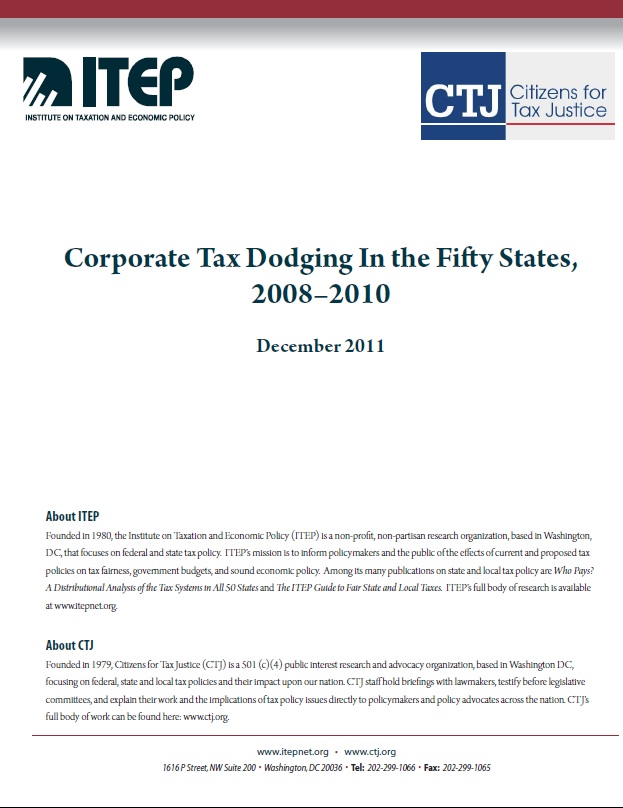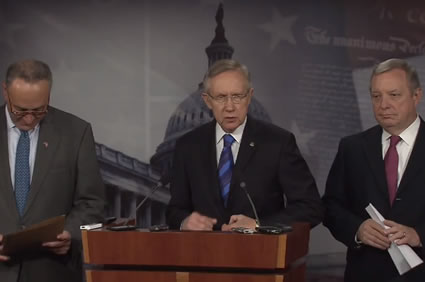December 7, 2011 12:21 AM | Permalink | ![]()
NEW REPORT: 265 Major, Profitable U.S. Corporations’ Tax Avoidance Costs States $42 Billion Over Three Years
“Corporate Tax Dodging in the Fifty States, 2008-2010” follows  up on “Corporate Taxpayers and Corporate Tax Dodgers, 2008-2010” which was published in November by Citizens for Tax Justice (CTJ) and the Institute on Taxation and Economic Policy (ITEP). The two groups released their first major study on the federal income taxes that large, profitable American corporations pay on their U.S. pretax profits in 1984.
up on “Corporate Taxpayers and Corporate Tax Dodgers, 2008-2010” which was published in November by Citizens for Tax Justice (CTJ) and the Institute on Taxation and Economic Policy (ITEP). The two groups released their first major study on the federal income taxes that large, profitable American corporations pay on their U.S. pretax profits in 1984.
“Our report shows these 265 corporations raked in a combined $1.33 trillion in profits in the last three years, and far too many have managed to shelter half or more of their profits from state taxes,” said Matthew Gardner, Executive Director at the Institute on Taxation and Economic Policy and the report’s co-author. “They’re so busy avoiding taxes, it’s no wonder they’re not creating any new jobs.”
68 of the 265 Fortune 500 companies profiled paid no state corporate income tax in at least one of the last three years and 20 of them averaged a tax rate of zero or less during the 2008-2010 period.
Among the 20 corporations paying zero or less in state corporate income taxes over the three year period are: Utility provider Pepco Holdings (DC); pharmaceutical giant Baxter International (IL); chemical maker DuPont (DE); fast food behemoth Yum Brands (KY); high tech manufacturer Intel (CA).




 The one-fifth of one percent of taxpayers affected by the Senate Democrats’ proposed millionaire surcharge would pay 2.1 percent of their incomes in higher taxes, on average, under the proposal.
The one-fifth of one percent of taxpayers affected by the Senate Democrats’ proposed millionaire surcharge would pay 2.1 percent of their incomes in higher taxes, on average, under the proposal. Government spending measures are the best way to reduce unemployment, but if lawmakers insist on using tax policy instead, they should revive the Making Work Pay Credit, as some Senators have discussed recently.
Government spending measures are the best way to reduce unemployment, but if lawmakers insist on using tax policy instead, they should revive the Making Work Pay Credit, as some Senators have discussed recently. A change in the Medicare tax that was enacted last year as part of health care reform will take an important but limited first step towards implementing President Obama’s “Buffett Rule,” the principle that tax laws should not allow millionaires to pay a smaller percentage of their income in federal taxes than do middle-class taxpayers. To further implement the Buffett Rule, Congress could end the existing income tax preference for capital gains and dividends or enact the type of surcharge for income exceeding $1 million that Senate Democrats recently proposed.
A change in the Medicare tax that was enacted last year as part of health care reform will take an important but limited first step towards implementing President Obama’s “Buffett Rule,” the principle that tax laws should not allow millionaires to pay a smaller percentage of their income in federal taxes than do middle-class taxpayers. To further implement the Buffett Rule, Congress could end the existing income tax preference for capital gains and dividends or enact the type of surcharge for income exceeding $1 million that Senate Democrats recently proposed. Corporations are lobbying Congress to exempt their offshore profits from U.S. corporate income taxes, either permanently (by enacting a “territorial” tax system) or temporarily (by enacting a “repatriation” amnesty). Congress should reject both.
Corporations are lobbying Congress to exempt their offshore profits from U.S. corporate income taxes, either permanently (by enacting a “territorial” tax system) or temporarily (by enacting a “repatriation” amnesty). Congress should reject both. Writing for Tax Notes, Citizens for Tax Justice director Robert McIntyre recalls the role that his organization played in the process that led to the Tax Reform Act of 1986.
Writing for Tax Notes, Citizens for Tax Justice director Robert McIntyre recalls the role that his organization played in the process that led to the Tax Reform Act of 1986. If the following actions were taken, much of the inequity in our tax system, which is part of what’s driving the Occupy Wall Street and other affiliated protests, would be eliminated.
If the following actions were taken, much of the inequity in our tax system, which is part of what’s driving the Occupy Wall Street and other affiliated protests, would be eliminated.